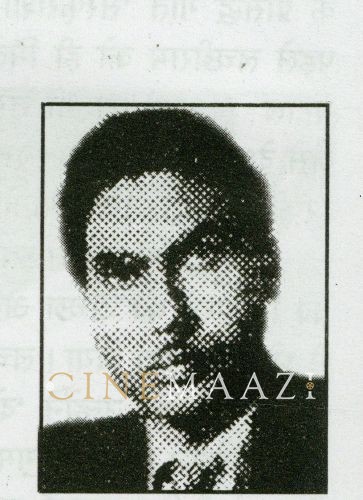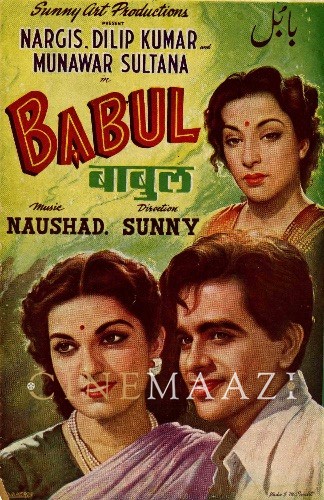Vinod

Subscribe to read full article
This section is for paid subscribers only. Our subscription is only $37/- for one full year.
You get unlimited access to all paid section and features on the website with this subscription.
Not ready for a full subscription?
You can access this article for $2 , and have it saved to your account for one year.
- Real Name: Eric Roberts
- Born: 28 May, 1922 (Lahore, British India)
- Died: 25 December, 1959
- Primary Cinema: Hindi
- Spouse: Sheela Betty
- Children: Veena Solomon, Veera Mistry
Film music director Vinod is synonymous with the popular song Lara lappa lara lappa lai rakhda rendered by Mohammed Rafi and Lata Mangeshkar in the film Ek Thi Ladki (1949). A talented music director in Punjabi films in Lahore, he moved over to Bombay with filmmaker Roop K Shorey’s team, and composed music for several Hindi films. Other memorable songs he composed were Jab kisi ke rukh pe zulfen aa ke lahrane lageen from Anmol Ratan (1950), as well as Yaad anewale phir yaad aa rahe hain and Shikwa tera main gaaun from Anmol Ratan. For Ek Thi Ladki (1949) he composed Dilli se aya bhai Pingu, Ab haal-e-dil ya haal-e-jigar kuchh na poochhiye, and Ghatkari matwari kari ghir ayi. Other good songs he composed were Ankhiyan mila ke ankhiyon ki need chura ke aa from Mukhdaa (1951), Thumak thumak chali kamini from Ek Do Teen (1953), and O Arabpati ki chhori dil le gayee from Makhichoos (1956).
He was born in Lahore on 28 May, 1922 into a Punjabi Christian family, converted from Hinduism. As a child, he was fascinated by the music played at Punjabi Hindu weddings. Learning music from the famous music director Pandit Amarnath, he was just 17 when his first official record composition was released, Samne aayaga koi jalwa dikhayega koi. He adopted the name Vinod for professional reasons. He started composing songs for films in 1946. He composed 11 songs, written by Aziz Kashmiri, for the film Khamosh Nigahen (1946). Vinod’s compositions in the Punjabi film Chaman (1948) were rendered by Lata Mangeshkar after veteran music director Master Ghulam Haider, who had introduced Lata Mangeshkar as a film playback singer, recommended Lata to Vinod. Vinod went on to compose music for Ek Thi Ladki (1949). The music was a huge hit. It included the popular song Larra lappa larra lappa layi rakhda sung by Lata Mangeshkar and Mohammed Rafi.
Vinod subsequently moved to Bombay when Roop Kumar Shorey, a producer for whom Vinod had previously composed songs, brought his team to the city. He composed music for 36 films—30 in Hindi and six in Punjabi. Some of his Punjabi songs include Saari raat tera tak ni aa rah, and Wey tarian taun puchh chann wey. He also composed four non-film songs. As a composer, he was known to occasionally insert Hindi songs into Punjabi films and Punjabi song lyrics into Hindi film songs. This was his trademark.
He displayed considerable versatility in his compositions. While Jab kisi ke rukh pe zulfen aa ke lahrane lageen rendered by Talat Mahmood was melodious and sweet, the duet Yaad anewale phir yaad aa rahe hain by Talat Mahmood and Lata Mangeshkar ranks among their best. Similarly, Ab haal-e-dil ya haal-e-jigar kuchh na poochhiye by Rafi and Lata Mangeshkar was a beautiful melody that is strangely almost forgotten. Musically, Vinod’s work in Ek Thi Ladki was a blend of the vintage and Golden Era represented by Zeenat Begum who belonged to the former age, and Lata Mangeshkar who would go on to become the dominant singer of the Golden Era. He composed the lovely duet Thumak thumak chali kamini rendered by Asha Bhosle and G M Durrani, while O Arabpati ki chhori dil le gayee by Talat Mahmood and Geeta Dutt is another fun and light-hearted duet.
On the personal front, Vinod married Sheela Betty in Lahore, and subsequently moved to Delhi. The couple had two daughters Veena Solomon and Veera Mistry.
Despite his considerable talent, Vinod did not achieve sustained commercial success. He passed away in penury on 25 December, 1959. He was 37.
-
Filmography (6)
SortRole
-
Asliyat 1974
-
Namaste Ji 1965
-
Bewaqoof 1960
-
Bhakta Pralhad 1959
-

Babul 1950
-









.jpg)



